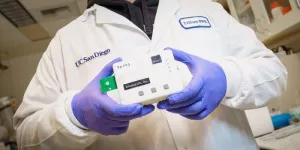“We conducted this study to address lingering questions about Paxlovid and virologic rebound in COVID-19 treatment,” said corresponding author Mark Siedner, M.D., MPH, an infectious disease clinician and researcher in the Division of Infectious Diseases at Massachusetts General Hospital. "We found that the virologic rebound phenomenon was much more common than expected—in over 20% of people taking Paxlovid—and that individuals shed live virus when experiencing a rebound, implying the potential for transmission after initially recovering from the virus."
Paxlovid is an oral antiviral medication used to treat COVID-19. Previous studies demonstrate the medication's effectiveness in reducing hospitalization and death in cases of severe COVID-19 infection. Since the integration of Paxlovid into COVID-19 treatment, some patients have reported virologic rebound. A previously conducted phase 3 clinical trial known as EPIC-HR suggested that only 1% to 2% of patients taking Paxlovid experienced virologic rebound. However, the study by Siedner and colleagues suggests this phenomenon occurs far more often than previously suspected.
"Paxlovid remains a life-saving drug I prescribe to high-risk patients," said co-senior author Jonathon Li, M.D., an infectious disease physician and researcher in the Division of Infectious Diseases at Brigham and Women’s Hospital. “This study, while informative, does not change the fact that this drug is very effective at preventing hospitalizations and death. Instead, it offers valuable insights to Paxlovid patients, helping them understand what to expect and how long they might be contagious.”
Siedner, Li and other researchers from Mass General Brigham collected data from the Post-vaccination Viral Characteristics Study (POSITIVES), an ongoing study following individuals diagnosed with acute COVID-19 infections. Between March 2022 and May 2023, 142 individuals were selected for the study based on positive COVID-19 tests, medication prescriptions or physician referrals. Sorting participants by those who took a five-day Paxlovid regimen versus those who did not, they closely tracked patients’ viral loads and symptoms, cultured viral samples and performed whole genome sequencing. Patients who tested positive for COVID-19 after previously testing negative and those who exhibited two consecutive increases in viral loads following an initial reduction were classified as experiencing virologic rebound.
Investigators discovered that 20.8% of participants who took Paxlovid experienced virologic rebound, while only 1.8% of those who didn’t take Paxlovid had a similar rebound effect. Those with rebound also had prolonged viral shedding—for an average of 14 days compared to less than 5 days in those who did not experience rebound—indicating they were potentially still contagious for much longer. Importantly, Siedner’s team found no evidence of drug resistance among these patients.
The findings should not discourage clinicians from prescribing the medication, the researchers noted, but they should prompt them to counsel patients who take the medication about the risk for viral rebound and spreading the virus to others. Advising patients to re-test and isolate in case of rebound should be part of that conversation, the team said.
The original EPIC-HR study assessed outcomes for patients at only two time points. When the Mass General Brigham researchers aligned their data analysis with the select time points from the EPIC-HR study, they observed virologic rebound in only 2.4% of participants, suggesting that the previous study did not capture the full extent of virologic rebound.
“In our study, we were able to closely monitor patients from the onset of COVID-19 infection through treatment and rebound,” explained Li. “Unlike in the EPIC-HR study, which only assessed outcomes at two time points, we followed up with patients three times a week, sometimes for months, and performed in-home sample collection. Having both viral RNA levels and viral culture data also allowed us to paint a more comprehensive and nuanced picture of a patient’s experience with Paxlovid.”
This study is limited in that it was observational and not a randomized controlled trial, so the authors cannot be certain that the increased rebound rate seen in people taking Paxlovid was solely due to use of the drug. The team used a positive viral culture as a marker for one’s risk of transmitting the virus but could not formally measure how contagious someone experiencing virologic rebound was. Additionally, the team could not explain why some people experienced rebound while others did not — something they aim to explore with future studies. They also plan to investigate the biological mechanism behind the rebound phenomenon associated with Paxlovid and determine if changing the regimen length could help combat this rebound effect.
Authorship: Co-lead authors of the study include Gregory E. Edelstein (BWH), Julie Boucau (Ragon Institute of MGH, MIT and Harvard). Additional Mass General Brigham researchers include Rockib Uddin (MGH), Caitlin Marino (Ragon), May Y. Liew (MGH), Mamadou Barry (MGH), Manish C. Choudhary (BWH), Rebecca F. Gilbert (MGH), Zahra Reynolds (MGH), Yijia Li (BWH and MGH), Dessie Tien (MGH), Shruti Sagar (MGH), Tammy D. Vyas (MGH), Yumeko Kawano (BWH), Jeffrey A. Sparks (BWH), Sarah P. Hammond (MGH), Zachary Wallace (MGH), Jatin M. Vyas (MGH), co-senior author Amy K. Barczak (Ragon and MGH), and co-senior author Jacob E. Lemieux (MGH).
Disclosures: AKB reports consulting for ICON Government and Public Health Solutions. JZL reports consulting for Abbvie and research funding from Merck. SPH reports research funding from GlaxoSmithKline and has served on an advisory board for Pfizer.
Funding: This work was supported by the National Institutes of Health (U19 AI110818 and R01 AI176287), the Massachusetts Consortium for Pathogen Readiness SARS-CoV-2 Variants Program, and the MGH Department of Medicine. Additional support was provided by the Ragon Institute BSL3 core, which is supported by the NIH-funded Harvard University Center for AIDS Research (P30 AI060354). Drs. Sparks and Wallace are supported by the National Institute of Arthritis and Musculoskeletal and Skin Diseases (R01 AR080659). Dr. Sparks is also supported by the Llura Gund Award for Rheumatoid Arthritis Research and Care. The funders had no role in study design; in the collection, analysis, and interpretation of data; in the writing of the manuscript; or in the decision to submit the manuscript for publication.
Paper cited: Edelstein, G. et al. “SARS-CoV-2 virologic rebound with nirmatrelvir-ritonavir therapy: a prospective observational cohort study” Annals of Internal Medicine DOI: 10.7326/M23-1756
###
About Mass General Brigham
Mass General Brigham is an integrated academic health care system, uniting great minds to solve the hardest problems in medicine for our communities and the world. Mass General Brigham connects a full continuum of care across a system of academic medical centers, community and specialty hospitals, a health insurance plan, physician networks, community health centers, home care, and long-term care services. Mass General Brigham is a nonprofit organization committed to patient care, research, teaching, and service to the community. In addition, Mass General Brigham is one of the nation’s leading biomedical research organizations with several Harvard Medical School teaching hospitals. For more information, please visit massgeneralbrigham.org.
END



